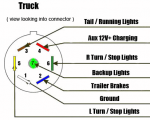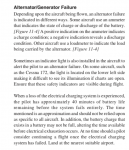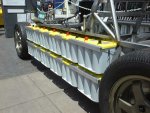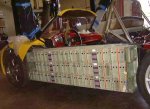You are using an out of date browser. It may not display this or other websites correctly.
You should upgrade or use an alternative browser.
You should upgrade or use an alternative browser.
Understanding amp hours and lithium batteries
- Thread starter Porkchopexpress
- Start date
DaveInDenver
Middle Income Semi-Redneck
I'm not defending A-hr as the best unit of measure, just saying that since just about every car, boat or plane at one time had an ammeter along with sometimes a voltmeter indicating an acceptable range knowing amp-hours is a familiar carry over. Watching the rate of electron flow in and out is really what you want anyway, volts and thus watts are secondary.Coulomb counting can just as easily produce Wh by multiplying by the voltage at each sample. Most Coulomb counters will also display in Wh. Maybe back in the day when everything was lead acid batteries, and everything ran of linear regulators which 'conserve' current, then Ah was at least kind of defensible. Now with (almost) everything running of switch mode power supplies which 'conserve' power and all sorts of battery chemistries with different nominal voltages, Ah make even less sense.
I believe pilots still have to understand essentially coulomb counting manually for their license tests even though I'd have guessed anything now would have a watt meter and do the calculations for you. It's just a matter of knowing your starting point and watching alternator charge rate and load to avoid going into deficit, which can be done at a glance and in your head with a simple analog gauge.
Porkchopexpress
Well-known member
NopeI believe pilots still have to understand essentially coulomb counting manually for their license tests....
Ah actually is **the** most accurate measure for stored DC energy, most closely reflects the way the chemistry/physics behave.
Only use Wh when voltage conversion is a factor, or otherwise comparing unlike systems.
No it is not. Watt hours is the actual measurements of stored energy. Amp hour is not a measurement of energy at all, you can assume some fixed voltage to estimate energy, but we all know a battery voltage is not fixed. Even worse, Ah is used to compare different chemistries. A 100Ah LiFePO4 battery has almost 10% more stored energy than a 100Ah lead acid battery.
I'm not defending A-hr as the best unit of measure, just saying that since just about every car, boat or plane at one time had an ammeter along with sometimes a voltmeter indicating an acceptable range knowing amp-hours is a familiar carry over. Watching the rate of electron flow in and out is really what you want anyway, volts and thus watts are secondary.
I believe pilots still have to understand essentially coulomb counting manually for their license tests even though I'd have guessed anything now would have a watt meter and do the calculations for you. It's just a matter of knowing your starting point and watching alternator charge rate and load to avoid going into deficit, which can be done at a glance and in your head with a simple analog gauge.
Apologies, certainly didn't mean to suggest you were.
DaveInDenver
Middle Income Semi-Redneck
billiebob
Well-known member
billiebob
Well-known member
another cool fact about ammeters
In the hot rodding and resto mod markets one of the first changes is replacing the ammeter with a volt meter.
Ammeters measure flow, plus or minus and are engineered for the original equipment. The current flows thru the ammeter.
Add a massive stereo and you are dramatically increasing the potential minus flow far beyond the ammeters capabilities.
Same with adding a bunch of cell, tablet, gps, laptop chargers, or a winch.
Any change needs to be a complete upgrade to avoid melting.... or burning things
yep, all power systems are engineered for a particular load, playing with one part and not changing the rest will often start a fire"Owner of an overland® camper tries paralleling 20 USB charge packs to run his laptop and cell booster working off grid for a week."
View attachment 665972
In the hot rodding and resto mod markets one of the first changes is replacing the ammeter with a volt meter.
Ammeters measure flow, plus or minus and are engineered for the original equipment. The current flows thru the ammeter.
Add a massive stereo and you are dramatically increasing the potential minus flow far beyond the ammeters capabilities.
Same with adding a bunch of cell, tablet, gps, laptop chargers, or a winch.
Any change needs to be a complete upgrade to avoid melting.... or burning things
Last edited:
Porkchopexpress
Well-known member
I'm just guessing that if you asked 100 professional pilots about coulomb counting, 99 would look at you funny but they could tell you various electrical indication limits associated with their type rating and any memory actions for electrical emergencies.This isn't understanding current flow? From FAA-H-8083-15B. I'm not a pilot but isn't this the handbook you'd use training to get an instrument rating?
Last edited:
OllieChristopher
Well-known member
This whole Amp hour thing is a weird quirk of the battery industry and makes very little sense. It is crazy that you would try to represent energy storage (which is what we are after) with a Amp hours. Really it should be in Joules, but Watt hours at least makes physical sense.
Rando I do see what you point of view is. However it takes more math steps to convert a measurement of forced energy into the actual power of electrical current. As far as I know I have never seen a Joule meter being used or sold in commercial or consumer level. And at my level of math education I could not even begin to figure out a new formula for converting forced energy.
And the reality is Joules is used for much more than electrical energy. It's a unit of physical force that has to be converted to electrical current to be of any use.
Amps are an actual measurement of electrical currents ready to decipher and a simpler form and understanding of working with electricity. Amps and amp hours are what myself and many others have used for decades to measure current.
It does make one think and you are thinking outside the box which is a good thing!!
OllieChristopher
Well-known member
I'm not defending A-hr as the best unit of measure, just saying that since just about every car, boat or plane at one time had an ammeter along with sometimes a voltmeter indicating an acceptable range knowing amp-hours is a familiar carry over. Watching the rate of electron flow in and out is really what you want anyway, volts and thus watts are secondary.
I believe pilots still have to understand essentially coulomb counting manually for their license tests even though I'd have guessed anything now would have a watt meter and do the calculations for you. It's just a matter of knowing your starting point and watching alternator charge rate and load to avoid going into deficit, which can be done at a glance and in your head with a simple analog gauge.
That about sums it up Dave.
billiebob
Well-known member
Martinjmpr
Wiffleball Batter
Another dumb question that seems hard to find a strait answer with search engines, will your truck camper battery slowly charge off the vehicle if connected to the trailer 7 way connector plug? I understand the wires are a thin gauge and to get a useful charge you need to add a dc to dc charger and thicker wiring and a disconnect but will the batteries charge at all from the 7 way?
It actually depends on the vehicle. Some do, and some don't. Also, some vehicles with computers and "smart" charging systems will only send power through the charging connector if it "senses" that a trailer is attached, so you can't necessarily check by just putting a voltmeter on the #4 pin.

Best way to check would be like this: With no load on the camper battery and no connection to the tow vehicle, put the multimeter leads on the camper battery and make a note of the voltage. Then, connect the tow vehicle to the camper (with the engine running) and check again. If it's charging, there should be a noticeably higher voltage at the battery. There may be other ways to check but that's the only one I can think of that would work every time.
I've also seen in some of the Facebook camper groups I'm in that on some tow vehicles there is a fuse for the charging line and that from the factory, there is no fuse in that slot on the fuse block, so the owner would have to put the fuse in line before it would start sending power to the trailer.
With good reason! Not just "how its done" or easy calculations.Amps are an actual measurement of electrical currents ready to decipher and a simpler form and understanding of working with electricity. Amps and amp hours are what myself and many others have used for decades to measure current
Amp hours relate to the basic chemical reaction of the battery whereas Watt hours are much more affected by state of charge when charging and discharging and by rate of charge and discharge.
Taking a LFP battery as an example, when new the CURRENT charge to discharge efficiency is about 99.5%. As the battery ages this efficiency INCREASES! i.e. almost all the amps × hours put in can be taken out. BUT the Watt hours put in and Watt hours taken out depend where in the cycle they are put in and how fast they are out in. Watt hours in the early part of the cycle are reasonably efficient but decrease in efficiency as voltage rises.
TL;DR Coulomb counters show amps and amp hours natively because that is more accurate.
It is Watt hours that are derived.
But Wh are good for comparing energy usage over time, between say mains AC load devices and 12Vdc
or the two different sides of an inverter.
Same with propane, or gasoline for that matter.and yet vehicles burn to the ground every day
View attachment 666220
Knowledge / skillz / good design / careful implementation / quality components / vigilance over time
all are required together, one sub par factor can cause disaster it is true.
Does not mean that those fuels should not be used full stop.
Similar threads
- Replies
- 1
- Views
- 1K
- Replies
- 40
- Views
- 4K
- Replies
- 17
- Views
- 3K






